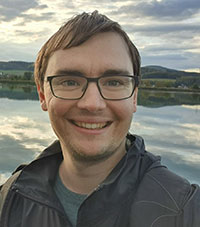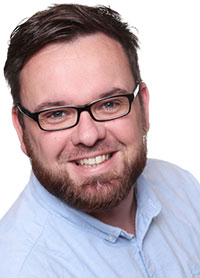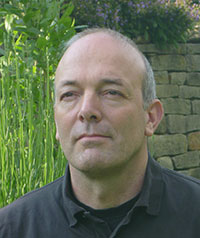 Kevin Stevens*. Institute for Geology, Mineralogy, and Geophysics, Ruhr University Bochum, Germany. Corresponding author. kevin.stevens@rub.de
Kevin Stevens*. Institute for Geology, Mineralogy, and Geophysics, Ruhr University Bochum, Germany. Corresponding author. kevin.stevens@rub.de
Kevin Stevens studied geosciences at Ruhr University Bochum. He worked at the Institute for Geology, Mineralogy and Geophysics of Ruhr University Bochum, Germany, as a research assistant and lecturer were he finished his PhD in 2017 on belemnite biomineralization and geochemistry. Since 2022, he is employed at the energy and mining government agency of the state of North Rhine-Westphalia and a guest researcher at Ruhr University Bochum. His research interests include fossil cephalopods, ichthyology, biomineralization, and geochemistry.
![]()
 Alexander Pohle*. Institute for Geology, Mineralogy, and Geophysics, Ruhr University Bochum, Germany and Palaeontological Institute and Museum, University of Zurich, Switzerland. alexander.pohle@rub.de
Alexander Pohle*. Institute for Geology, Mineralogy, and Geophysics, Ruhr University Bochum, Germany and Palaeontological Institute and Museum, University of Zurich, Switzerland. alexander.pohle@rub.de
Alexander Pohle studied Biology with a minor in Earth System Science for his BSc at the University of Zurich, Switzerland. This was followed by a MSc in Palaeontology and a PhD in Evolutionary Biology at the Palaeontological Institute and Museum of the University of Zurich. His dissertation was awarded with a distinction from the Faculty of Science of the University of Zurich. In 2023, he started a Postdoc position in the Department of Sediment and Isotope Geology at the Ruhr-University Bochum, Germany. His research is mainly focused on understanding phylogenetic relationships of fossil cephalopods using modern computational tools, as well as their taxonomy and palaeobiology.
![]()
 René Hoffmann. Institute for Geology, Mineralogy, and Geophysics, Ruhr University Bochum, Germany. rene.hoffmann@rub.de
René Hoffmann. Institute for Geology, Mineralogy, and Geophysics, Ruhr University Bochum, Germany. rene.hoffmann@rub.de
René Hoffmann received a diploma and a PhD from the Freie Universität Berlin in 2005 and in 2009 respectively. His research interests have primarily focused on ammonites, an extinct group of cephalopods. Over the years he extended his research to living cephalopods. Hoffmann is mainly interested in the palaeobiology and palaeoecology of the ammonites. He has conducted field research in Japan, Russia, and Morocco. Hoffmann applied first non-invasive imaging methods such as computed-tomography to reconstruct the complex internal architecture of ammonite shells. In recent years more geochemical proxy data were applied to decipher the palaeoecology and palaeobiology of this extinct group that ruled the world oceans for hundreds of millions of years. This research started at the Ruhr-Universität Bochum where he is the head of the microanalytical laboratories.
![]()
 Adrian Immenhauser. Institute for Geology, Mineralogy, and Geophysics, Ruhr University Bochum, Germany. adrian.immenhauser@rub.de
Adrian Immenhauser. Institute for Geology, Mineralogy, and Geophysics, Ruhr University Bochum, Germany. adrian.immenhauser@rub.de
Adrian Immenhauser received his PhD from the University of Berne, Switzerland. He has been an Assistant Professor at Free University Amsterdam. In 2006 he accepted a position as Professor and Chair for Sediment and Isotope Geology at Ruhr-University Bochum, Germany. He served as President and Past President of the International Association of Sedimentologists (IAS) and has been (and still is) editor and associate editor of several international journals. With his colleagues and students, Adrian's research has mainly focussed on deciphering the sedimentary archive of the geological record, predominantly abiogenic, biogenic and organomineralic carbonates.

